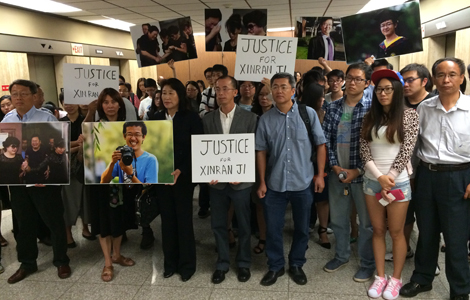Beijing to cancel public records fees
Updated: 2014-08-14 09:17
(CRIENGLISH.com)
|
||||||||
The Municipal Development and Reform Commission of Beijing has said the city is to cancel the charge for the management of personal record files, or better known as Dang'an before 2016.
The timetable was released after a Xinhua article questioned the whereabouts of the collected money on Tuesday.
Currently, people who entrust public record centers to keep their files need to pay 120 RMB, or about $20, a year for the service.
The centers in Beijing can collect up to hundreds of millions yuan annually, while the service providers nationwide can earn around a billion yuan from the business, according to the report.
A Dang'an is a document which includes information about the owner's education background, employment records, qualifications and physical status etc.
Things you need to know about Dang'an:
Dang'an includes one's education records, working permits, technical level, vocational qualifications, employment records, physical status, political status and crime records, etc.
What's it for?
-Dang'an is necessary when one gets promoted.
-Dang'an helps a public servant applicant pass the political censorship.
-Dang'an is necessary for fathers applying for a birth permit for a baby.
-Dang'an is necessary for the retirees to claim pension as pensions will be granted according to years at work and seniority recorded in the files.
Where to keep Dang'an?
People are not allowed to keep their own Dang'an files by themselves. Records of students are kept in their schools till their graduations, then, the files would be transfered to their employers, personal agencies or archive bureaus at their working locations.
Employees of private or foreign companies which are ineligible for keeping personal record files have to entrust the work with the personal agencies or archive bureaus in their hometowns.
A brief history of Dang'an
In the past, the Dang'an archival system was working together with Hukou (household registation) to maintain public records of Chinese citizens.
Before China's reform, the dossiers were consulted by work unit officials as they made decisions about the major life events of those directed by them.
A work unit managed employees through the Dang'an system. Employees cannot transfer to another work unit without his Dang'an.
As Chinese economic reform proceeded, the situation has been less clear-cut, as the Dang'an system conflicts with market-oriented labour contracts. Graduates have been able to choose their own employment since the mid-1990s in most regions, and marriage has not required work unit consent since 2003.
Some private or foreign companies now do not require access to these documents. However, promotions and some social security benefits are still based on information in their Dang'an.
The records of your performance at school and at work or a serious illness will be kept in your Dang'an and travel with you for the rest of your life. If one breaks the law, Dang'an will also be used in the investigation.

 Enter the dragon - the wax dragon
Enter the dragon - the wax dragon
 Ebola collaboration urged
Ebola collaboration urged
 Chinese rally at court for Ji
Chinese rally at court for Ji
 China's Napa Valley bid ripe for growth
China's Napa Valley bid ripe for growth
 Wanda's Hollywood premiere gets welcome
Wanda's Hollywood premiere gets welcome
 Sheriff official: Robin Williams killed himself
Sheriff official: Robin Williams killed himself
 Chinese warships visit US navy base after joint drill
Chinese warships visit US navy base after joint drill
 Unique panda triplets take a bow
Unique panda triplets take a bow
Most Viewed
Editor's Picks

|

|

|

|

|

|
Today's Top News
Brazil presidential candidate Campos killed in plane crash
US Marine deployment raises brows
China, global markets spur Priceline deal
More than 1,000 auto firms probed
Chinese fans mourn beloved star
Deng TV series lifts the lid on key years
Futures consultants see future in China
Menlo Park VC invests in China's medical tourism
US Weekly

|

|







